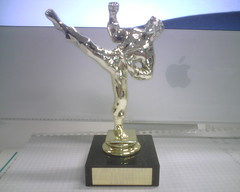We hosted our first Hack Day last week at The Guardian. Amazing fun.
Here’s a 15min highlight reel:
We did a lot of the standard stuff that makes Hack Day so interesting, but there were a few innovations to the event format itself that I thought worked really well, too:
- DabbleDB. Simon Willison setup a simple hack submission queue using DabbleDB, a handy online database tool. It’s as if the software was designed for this purpose. Two nice benefits: 1) you can upload a screenshot with your submission which it displays nicely, and 2) it prints beautifully. I handed out a hardcopy of the hack demo queue for each judge who then used the list to take notes.
- Double Screens. We setup 2 projectors so we could jump back and forth between presentation locations and save some time. While one person was presenting, the next person was setting up on the other screen. I was a little worried it would be distracting, but that wasn’t a problem at all.
I think this is primarily what kept the pace up. We got through 37 hacks in just about an hour. At that pace you couldn’t really afford to look away. Oh, and Simon’s lightning timer was hugely helpful, too.
This then had the nice effect of giving the judges more time to deliberate…
- Comprehensive recognition. The judges went through every single hack and found a way to acknowledge each participant. Emily Bell did a sort of improv act dishing out the jokes. She first went through all the hacks that “we would have given an award to”. Then she handed out the trophies…
 Silly trophies. These worked perfectly. You can keep it on your desk. It makes no sense to anyone else. And it reinforces the idea that the recognition is for the work itself, not for winning a competition. We did hand out a couple of Flip cameras and Make Magazine generously offered some free subscriptions for the hardware hacks, but the emphasis was clearly on the hackers and their hacks, not the idea of ‘winning’.
Silly trophies. These worked perfectly. You can keep it on your desk. It makes no sense to anyone else. And it reinforces the idea that the recognition is for the work itself, not for winning a competition. We did hand out a couple of Flip cameras and Make Magazine generously offered some free subscriptions for the hardware hacks, but the emphasis was clearly on the hackers and their hacks, not the idea of ‘winning’.
Otherwise, it seemed to operate much like other Hack Days, except for the refreshing focus on hacks that mean something. I wasn’t sure what kind of hack quality to expect which was in fact very high, but I loved the fact that most of the hacks had the added dimension of context.
Many times a Hack Day results in a lot of amazing technology solutions for problems that don’t exist. I would never challenge the value of creativity for creativity sake, as that’s a big part of what Hack Day is about. But I was really happy to see that in addition to the impressive technical hacks things like Ben Griffiths’, Rob McKinnon’s and Simon Willison’s hacks (to name a few) presented data and information in new ways that could influence the way people think about what they are reading or interacting with.
Anyhow, the event was fantastic, and I’m really looking forward to doing it again.
Good stuff, Matt. Nice to see Hack Day spreading! (And to see Simon in his Fireeagle shirt!)